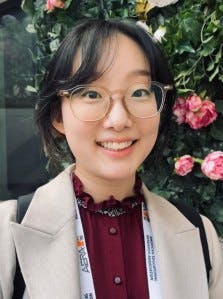Hyeungok Kang (Ph.D. ’24) strives to amplify the voices of underrepresented groups in early childhood education. A doctoral student in the Department of Educational Theory and Practice, Kang received a 2022 Outstanding Teaching Assistant Award from the UGA Center for Teaching and Learning and previously served as a student representative for the Korean-American Educational Researchers Association.
- Hometown: Seoul, South Korea
- Degree objective and graduation date: Ph.D. in educational theory and practice with an emphasis in early childhood education, summer 2024
- Degree(s) and graduation date: M.A. in child and family studies, Yonsei University, 2016; B.A. in child and family studies, Yonsei University, 2013
Starting a doctoral journey demands careful consideration. I was looking for an intellectually challenging and supportive academic environment—and as an international student, this also meant leaving behind all my existing support networks and entering a new world, so I wanted to be sure I chose the best university for me. Fortunately, during my application process, I had the opportunity to visit UGA while attending a conference in the U.S. When I visited campus to meet with faculty, staff, and graduate students, I knew this was the right place for me. At UGA, I discovered inspiring faculty members and a safe, supportive community. I was particularly impressed by the commitment of the people in my doctoral program to supporting marginalized voices with compassion.
What are your research interests?
My research interests focus on equity-oriented frameworks (e.g., culturally sustaining pedagogy and Asian critical theory), technology, and early childhood education. I explore how young minority children use technology to explore and express their identities. By making visible the invisible voices of children from historically underrepresented communities, my research aims to create equitable and inclusive learning spaces.
 What was your favorite class in the Mary Frances Early College of Education, and what was your favorite class to teach?
What was your favorite class in the Mary Frances Early College of Education, and what was your favorite class to teach?
My favorite classes included Interpretive Research with Children with Dr. Kyunghwa Lee, Bakhtinian Theories, Methods, and Questions with Dr. Joseph Tobin (retired), and Design & Development Tools with Dr. Lloyd P. Rieber. These courses not only helped me expand my knowledge but also encouraged me to reflect on my identity as a researcher.
My favorite class to teach was probably Integrated Creative Arts in the Early Childhood Education Lab. This class encouraged students to incorporate various creative methods, such as visual arts, music, and drama, into their preschool practicum classrooms. It was particularly rewarding to observe how students used various modalities to challenge the limitations of expected forms of expression in schools.
Why are you passionate about early childhood education?
I am passionate about early childhood education because it lays the foundation for lifelong learning and development. I believe in the power of early childhood education to shape young children’s futures, especially those from underrepresented communities. I also firmly believe that early childhood is an essential period for fostering equity, social justice, and a positive sense of self.
You have spent time mentoring first-generation college students, students of color, and international students at UGA, as well as leading peer support groups for international graduate students and teacher educators at universities across the U.S. How has participating in these groups contributed to your academic experience and sense of belonging on campus?
Being part of these groups has enriched my academic experience and informed my research agenda. For example, I participated in a study titled “Going Beyond the (Un)awakened Body: Arts-Based Collaborative Autoethnographic Inquiry of Korean Doctoral Students in the United States” (Kang et al., 2022). This study allowed me to collectively reflect on our own racialized experiences as foreign-born scholars from South Korea in the U.S., recognizing transnational experiences as valuable assets.
Additionally, these groups have allowed me to share stories, support others, and create spaces for collaborative reflection and growth. This helped me connect with others encountering similar challenges, supporting each other and building a safe community. By actively engaging in critical perspectives about the experiences and feelings of minorities, I felt more connected to the community. This involvement has strengthened my commitment to equity and helped me feel more valued on campus.
What are your plans following graduation?
After graduation, I will begin my next chapter as a tenure-track assistant professor in the Department of Child Development at California State University, San Bernardino. I plan to continue expanding my work to better support underrepresented groups. I look forward to learning and growing with the community by participating in various collaborations and community-based projects.